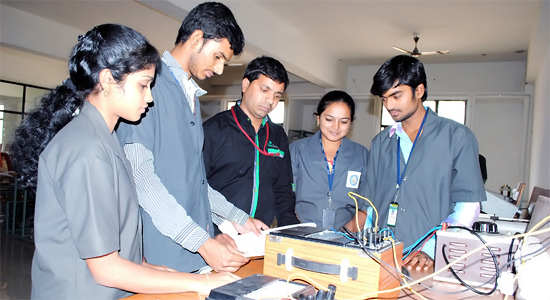Vision
``To empower students with cutting-edge knowledge in Information Technology through immersive learning skills to become Quality Professionals in Engineering and Technology.``
Our Mission
``To render quality professional education through a learner-centric approach, and to empower students by instilling principles of ethics and social responsibility, to meet the challenges in the field of Engineering and Technology, fostering their growth into Quality professionals.``
INFORMATION TECHNOLOGY
PROGRAM EDUCATIONAL OBJECTIVES (PEOs)
Graduates will be able to:
- Demonstrate technical competence with analytical and critical thinking to understand and meet the diversified requirements of industry, academia, and research.
- Exhibit technical leadership, team skills, and entrepreneurship skills to provide business solutions to real-world problems.
- Work in multi-disciplinary industries with social and environmental responsibility, work ethics, and adaptability to address complex engineering and social problems.
- Pursue lifelong learning, use cutting edge technologies, and involve in applied research to design optimal solutions.
PROGRAM SPECIFIC OUTCOMES (PSOs)
To ensure graduates:
- Have proficiency in programming skills to design, develop, and apply appropriate techniques to solve complex engineering problems.
- Have knowledge to build, automate, and manage business solutions using cutting edge technologies.
- Have excitement towards research in applied computer technologies.
ROLE OF INFORMATION TECHNOLOGY ENGINEER
Information Technology (IT) Engineers play a crucial role in designing, developing, and maintaining the infrastructure and systems that enable organizations to operate efficiently and securely. Here are the key responsibilities associated with the role:
- Network Infrastructure Management: Designing, implementing, and managing network infrastructure, including routers, switches, firewalls, and wireless networks, to ensure reliable connectivity and data transmission.
- Server Administration: Installing, configuring, and maintaining server hardware and software, including operating systems and virtualization platforms, to support organizational IT needs.
- Database Management: Designing and managing databases to store, retrieve, and manipulate data efficiently, ensuring data integrity and security.
- Cybersecurity Implementation: Implementing security measures, such as firewalls, intrusion detection systems, and encryption protocols, to protect organizational data and systems from cyber threats.
- System Integration: Integrating and configuring software and hardware components to ensure compatibility and seamless operation across different IT systems and platforms.
- IT Infrastructure Monitoring and Maintenance: Monitoring system performance, troubleshooting issues, and performing routine maintenance tasks to ensure optimal operation and minimize downtime.
- Backup and Disaster Recovery Planning: Developing and implementing backup strategies and disaster recovery plans to safeguard data and ensure business continuity in the event of system failures or disasters.
- Technical Support and Helpdesk Management: Providing technical support to end-users, resolving IT-related issues, and managing helpdesk operations to ensure timely resolution of problems and user satisfaction.
- IT Project Management: Planning, coordinating, and executing IT projects, including system upgrades, migrations, and implementations, within scope, budget, and timeline constraints.
- Emerging Technology Evaluation: Researching and evaluating new technologies and tools to identify opportunities for innovation and improvement in IT infrastructure and operations.
IT Engineers leverage their technical expertise in areas such as networking, systems administration, cybersecurity, and database management to support and enhance organizational IT capabilities. They play a critical role in ensuring the reliability, security, and efficiency of IT systems and infrastructure to meet the evolving needs of businesses and users.
CAREER PROSPECTS OF INFORMATION TECHNOLOGY
Information Technology (IT) Engineers have a wide range of promising career prospects across various industries due to their expertise in managing and optimizing technology infrastructure. Here are some key career opportunities for IT Engineers:
- Network Engineer
- Systems Administrator
- Database Administrator
- Cybersecurity Analyst
- Cloud Engineer
- IT Project Manager
- IT Consultant
- Technical Support Engineer
- System Analyst
FACULTY DETAILS
| S.No. | Name | Faculty Type | Designation | Level | Experience |
|---|---|---|---|---|---|
| 1. | Mr. MANIKANDAN | Regular | Asst. Prof | UG | 0 yrs 5 months |
| 2. | Mrs. ANIS PACKIA VINCY | Regular | Asst. Prof | UG | 0 yrs 4 months |






